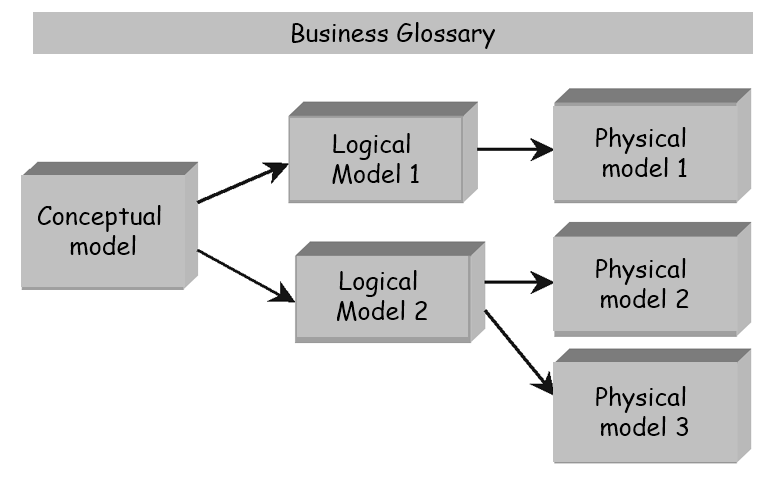erwin – Worldwide Leading Tool For Data Management
Industry’s only unified platform that combines Data and Business Process Modeling, Enterprise Architecture and Data Governance and all relevant architectural views for a consistent development of all domains of Enterprise Architecture.
erwin provides complete, powerful, easy to use tool-set for the support of Digital Transformation projects and their alignment with the basic business goals.
Both business process modeling as well as data modeling is enabled on all levels from top business levels to the lowest level of technical details.
erwin tools for Agile Governance of personal (and other) Data from all kinds of Data sources, both structured as well as unstructured, are essential for the business alignment with the GDPR requirements.
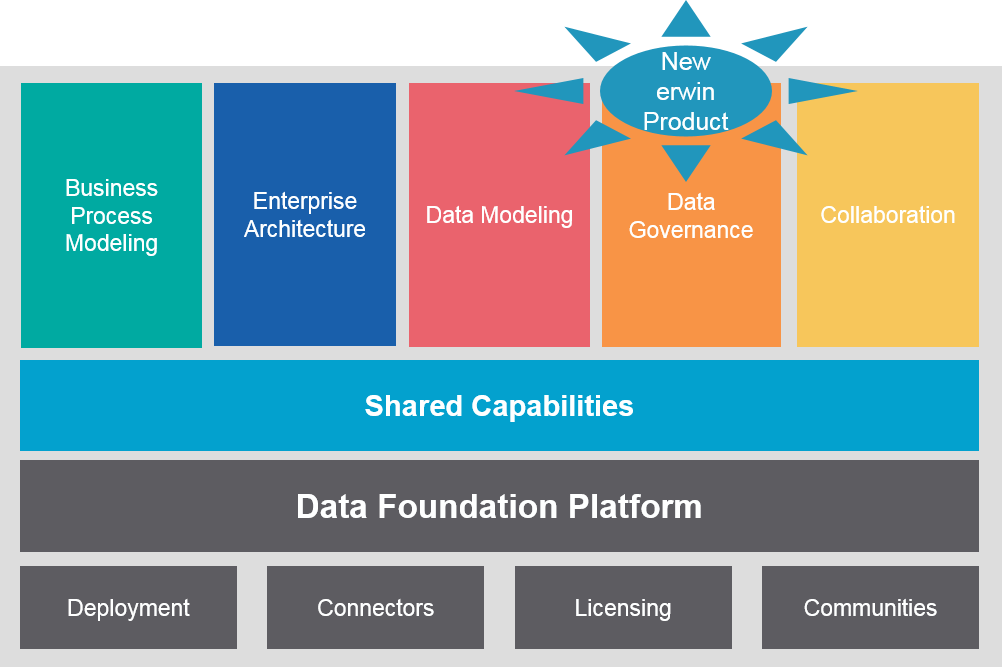
Business challenges
- Frequent business changes (business rules changes)
- Regulatory changes
- Increase in volume of services (i.e. integration of complementary services from partners)
- The need to improve the level of service quality (speed, accuracy and consistency of information)
- Speed of decision making based on reliable information
- Business environment competitiveness

Data challenges
- Provide right data (WHAT?)
- To the right person (WHO?)
- At the right time (WHEN?)
- In the right way (HOW?)
- At the right location (WHERE?)
- For the required activities (WHY?)
Domains of erwin usage
erwin has more than 25 years of enterprise architecture (EA) experience, helping organizations better understand, architect and transform the critical enterprise domains.
With erwin EA, you’ll know how business functions are aligned and structured, understand the information that powers business operations, and see where technology and innovation is lagging or can be used to drive competitive advantage.
erwin EA takes the guesswork out of business and IT transformation, and tames the inherent complexity of major IT initiatives like application rationalization, migrating to the cloud, and implementing Big Data.
Basic principles
- Data are resource
- Data are a resource with the highest value for whole business system and have to be accordingly managed.
- Data are accessible
- Users should have access to those data, that are necessary for them to do the tasks they have to do, regardless of organizational or functional distribution of data.
- Common Business Glossary and common data definitions
- Data (meta-data) should be defined in a consistent way throughout whole organizations for all business functions. Definitions of data meanings should be understandable to all users, unambiguous and accessible to all users
- Data security
- Data access should be properly secured so that un-authorized access should not happen.
Data architecture artifacts
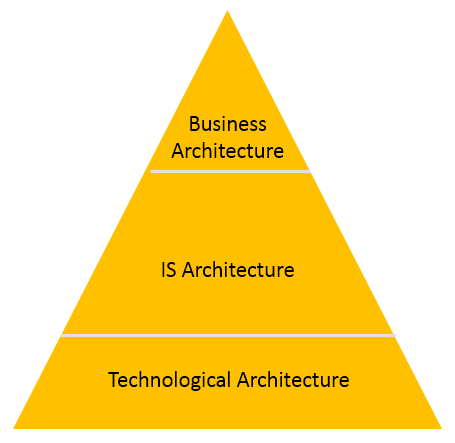
- Business Glossary
- Conceptual models
- Key success factors
- Logical business models
- …
- Migration models
- ETL models
- Physical models.
- …
- DDL
- DB catalogue..
Data Models Architecture – example
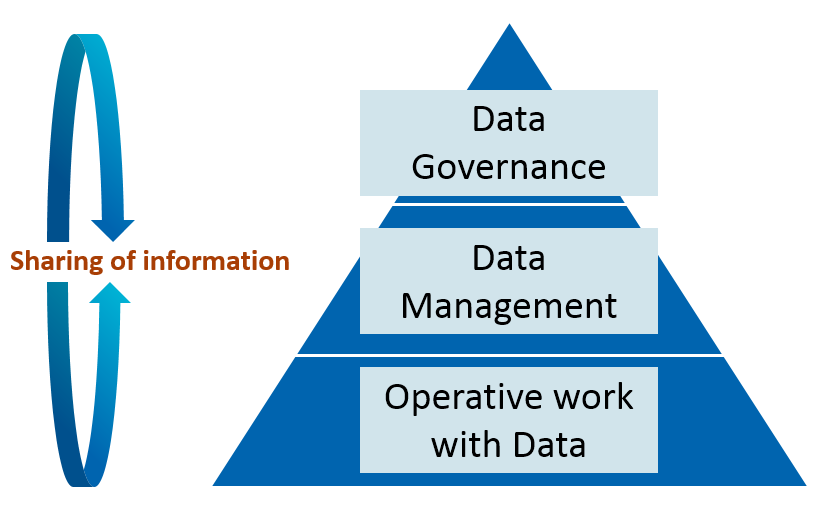
Sharing information between different type of Users
- Some Users need desktop tools for development and analises of Data Models
- Much more Users need understandable, consistent Data definitions accessible over web browsers and intuitive reports
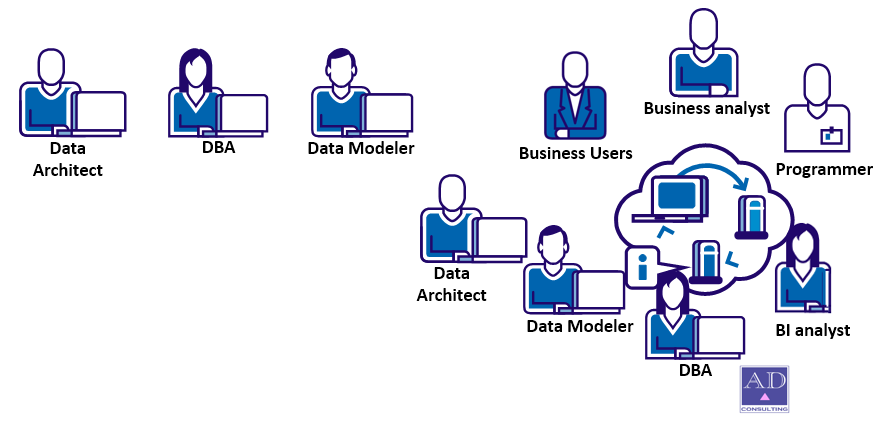
Data Architecture of models for a DW development – example
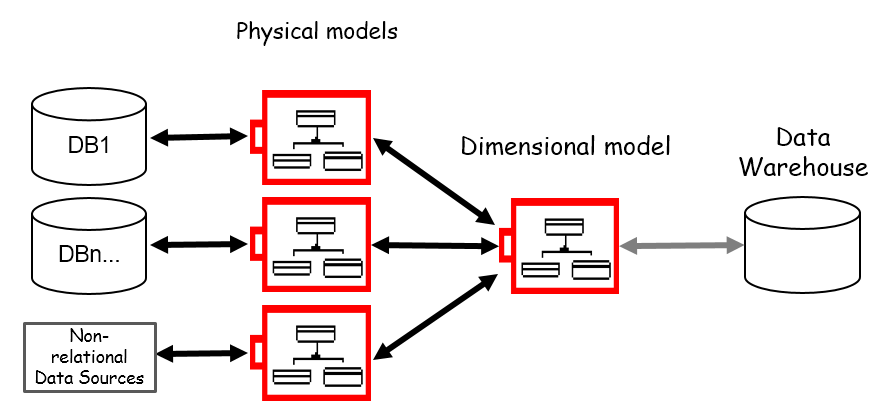
Development process – example
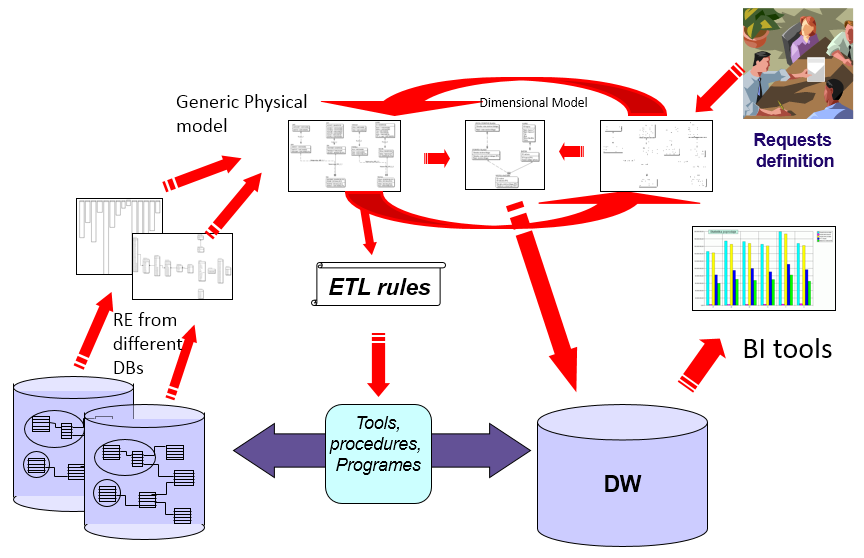
Typical issues, reasons for integration requests
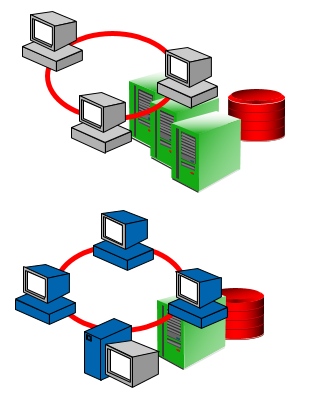
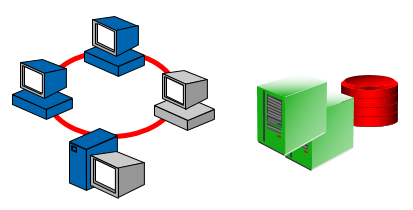
- Different locations, different operating systems
- Different data bases
- Different applications
- Different data structures
- Multiple entries and multiple versions of same data, more versions of truth
TOO MANY data – TOO FEW relevant business INFORMATION
Challenges for integrations of different Data sources
How to ensure:
- Unique naming and definitions of business terms
- Harmonized security levels
- Harmonized „code lists“ and classifications
- Harmonized structures and data formats
- Appropriate Data Quality
for the whole organization
- Between ERP…CRM…BI and other Information Systems
MDM – “Master Data Management”
Methods, procedures and tools, for ensuring, that all applications, all business dashboards and reports for a specific organization, would be conceived on one, central version (“master”) of master business data
- Examples of master data
- Business partners, products, articles, services….
- Main code-lists
- Some of main reasons for poor quality of master data
- No organization for Data Quality Governance
- Separate maintenance of the same data in different applications
- Non-consistent transferring, copying, amendments … of data between different applications
More versions of truth, which one is more reliable?
- Should be in-line with general Quality policy
- General guidelines : TQM/ISO9000/SixSigma…
- Quality policy for a specific organization….
Basic condition for Critical Success Factors monitoring
- Impact of Data Quality on the goals of businesses and success of performance
- Some of the basic criteria for Data Quality
- Correctness
- Completeness
- Consistency of data among various data sources (applications/DBs, reports, documents,…)
- Consistency of data regarding time dimension
- Relevance of data for business needs
- Traceability between summary and transactional data
- Timeliness
- …
Iterative (spiral) approach
- Iterations for a limited selected range
- Transparency of development
- Users are not aware of all requirements in advance
- Speed of completion of all phases of each iteration (requirements-analysis-design-programming-testing-integration)
- Possibility of re-definition of requirements for the next iteration after the completion of an iteration
- Possibility of parallel activities of the different teams
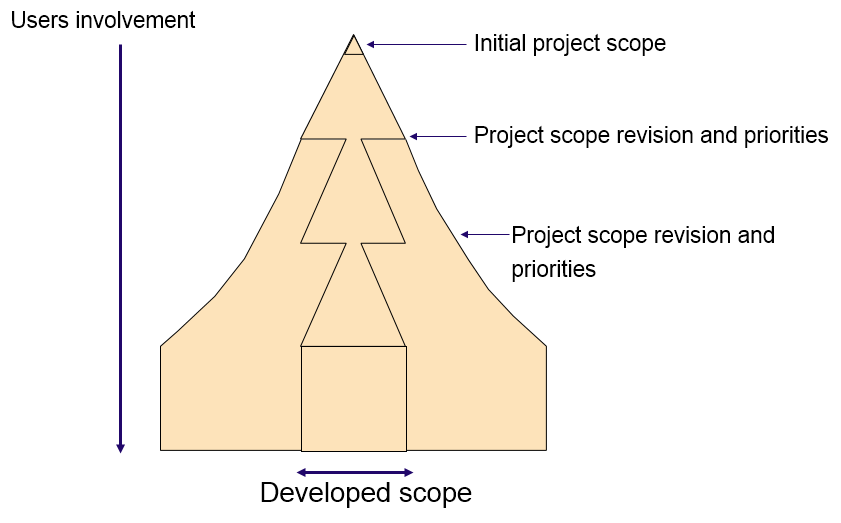
Iterative (spiral) approach – key conditions for successful implementation
- Iterativity can also be a problem …
… as each iteration focuses on a different area (of data)! - Integration can be ensured only if all iterations originate from the same Data Model
AD consulting provides users with basic and advanced training, full help support for the usage of erwin and consultancy services for all domains of erwin usage.
erwin Standard Edition
- Design and creation of database structures using visual models
- Documentation of basic business concepts and business rules
- Coordination of business rules and technical documentation
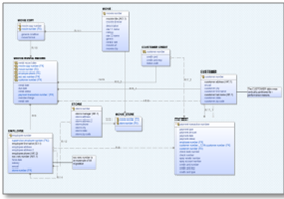
- Generating database structure directly from visual models for greater efficiency
- Setting standards for reusability: models framework, domains, naming standards, data types …
- Comparison of model and database with bi-directional syncing models, scripts and databases (comparison, selective update, and, if necessary, generating ALTER scripts)
- Reports and publications can be created in PDF, HTML or text format for both diagrams and metadata specifications.
- Integration and metadata exchange with data sources, BI tools, MDM Hubs, other tools for data modeling, ETL tools …
erwin Navigator Edition
- Provides read-only access to data models with the ability to analyze the impact of changes
- Reports and publications can be created in PDF, HTML or text format for both diagrams and metadata specifications
erwin Workgroup Edition
- Storing key data definitions in a central model repository
- Promoting the re-use of objects for higher efficiency and higher quality
- Simplifying of development through change management with conflict resolution and security
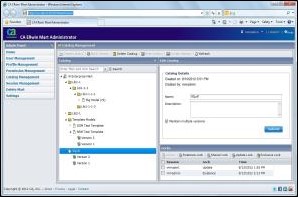
erwin for MS SQL Azure
More about tool
Benefits of Web Portal:
- Establishing trust in information (as users have a detailed overview of sources of data for data warehouse and business reports).
- Audit on sensitive data collection (where and how sensitive data is collected).
- Support for agile application development
- Enabling business analyst to use metadata to find out where to get information and what information can be obtained
Some characteristics of Web Portal:
- Visualization with the possibility of drill-down to view the details of objects (definitions, comments, …)
- Users can add comments to objects in the repository
- Search in metadata using keywords
- Links between metadata of different models (functionality of erwin Data Modeler Design Layer Architecture)

- Mapping resources for data warehouse (erwin Data Modeler Source-To-Target mapping)
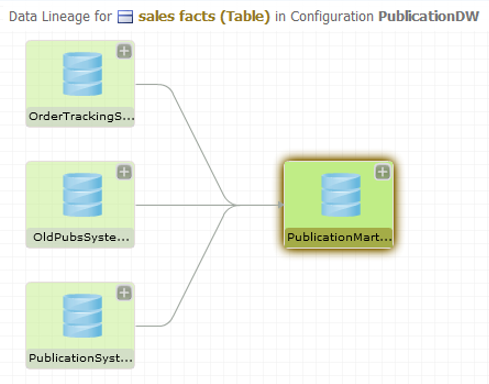
Benefits of Web Portal Data Governance Edition:
- Easier communication and a higher level of understanding among experts in various business areas using Business Glossary.
- Integration of “closed” applications into Business Glossary.
- Management of the life cycle of data and information
- when the data is collected,
- how long data is stored,
- what we do after the expiry date,
- reuse of data, if needed.
- Easier integration of data from multiple sources …
Some characteristics of Web Portal Data Governance Edition (in addition to the full functionality of a Web Portal):
- Business Glossary
- Semantic mapping
- Data mapping
- Data documenting
- Including of metadata from data servers
- Directly from relational databases
- Directly from the Big Data Hadoop distributions
- Including of models from third party modeling tools
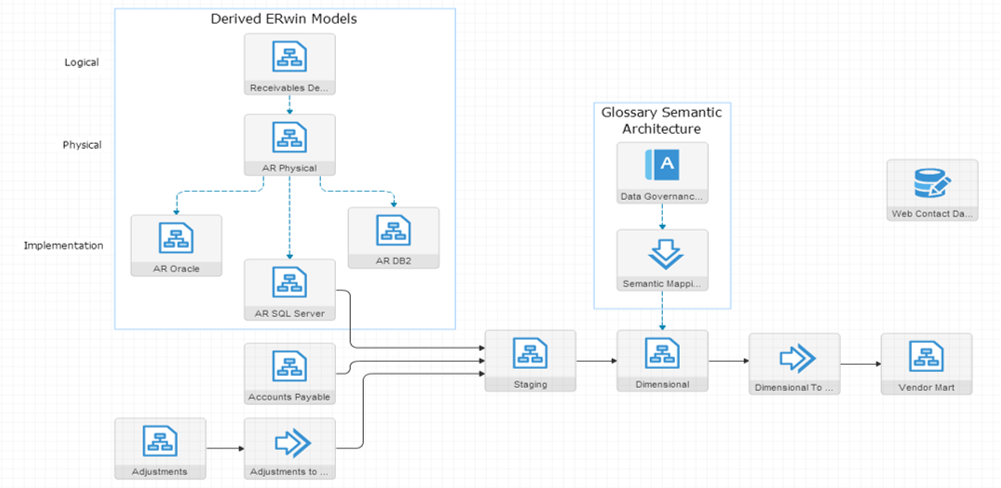 More about tool
More about tool- Safyr connects to one of the following ERP solutions:
- SAP ERP
- JD Edwards
- PeopleSoft
- Seibel
- Oracle (EBS)
- Sales Force
- Identifies metadata of the structure of the database including the relationships between tables
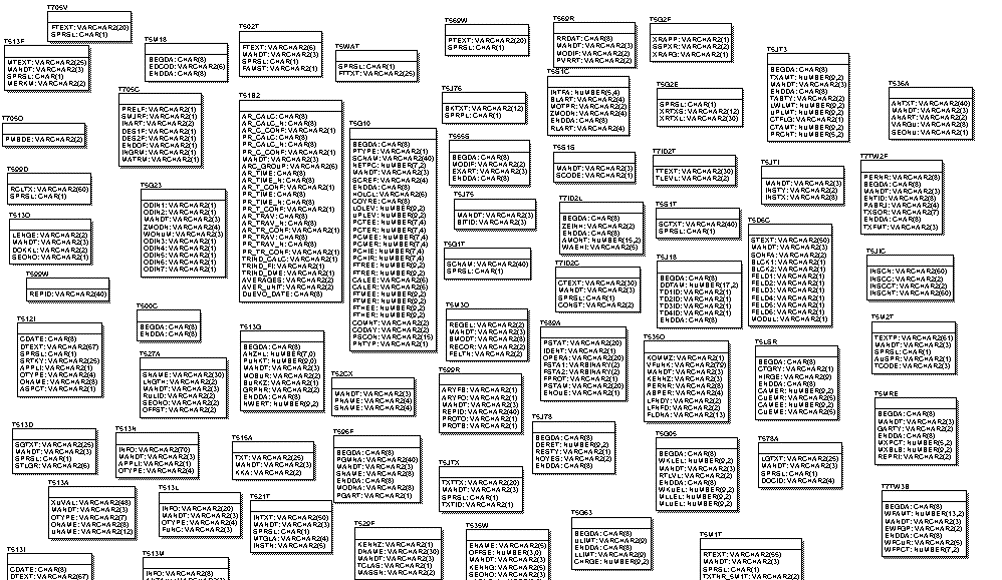
- The result of reverse engineering in the model using Safyr => full E/R representation of database
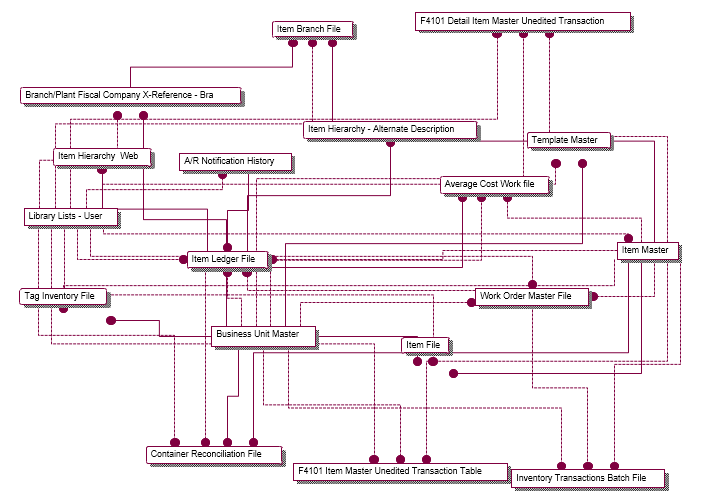
Awards
- #1 Global Market Share Leader in Data Modeling Tools, according to IDC
- erwin Again Named “Best Data Modeling Solution” by Database Trends and Applications Magazine
- #1 Most-Used Data Modeling Tool among data professionals, according to a recent DATAVERSITY survey.
- “erwin Data Modeler should be evaluated by any company that is about to embark on a major application development initiative or an application portfolio overhaul” according to Ovum

